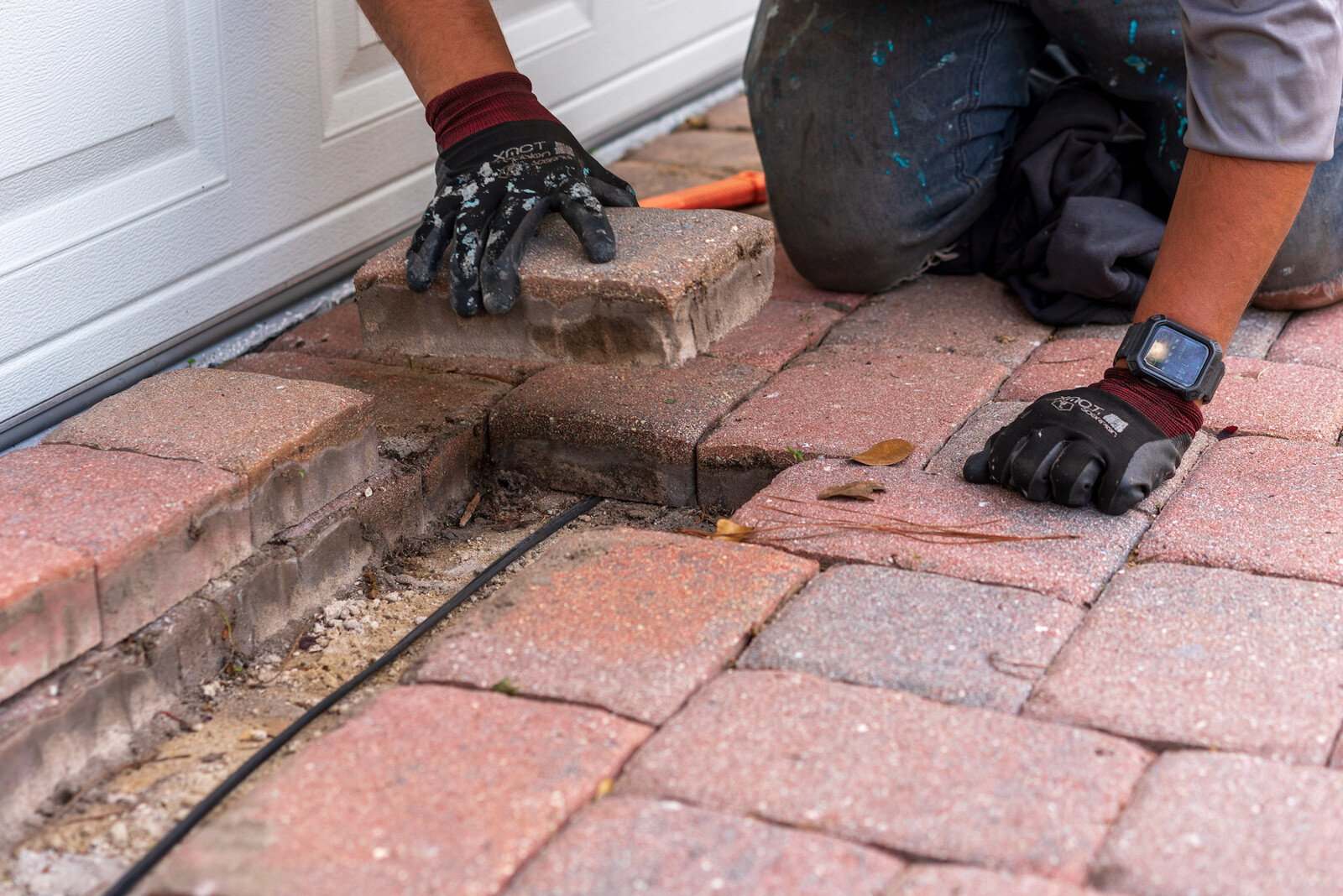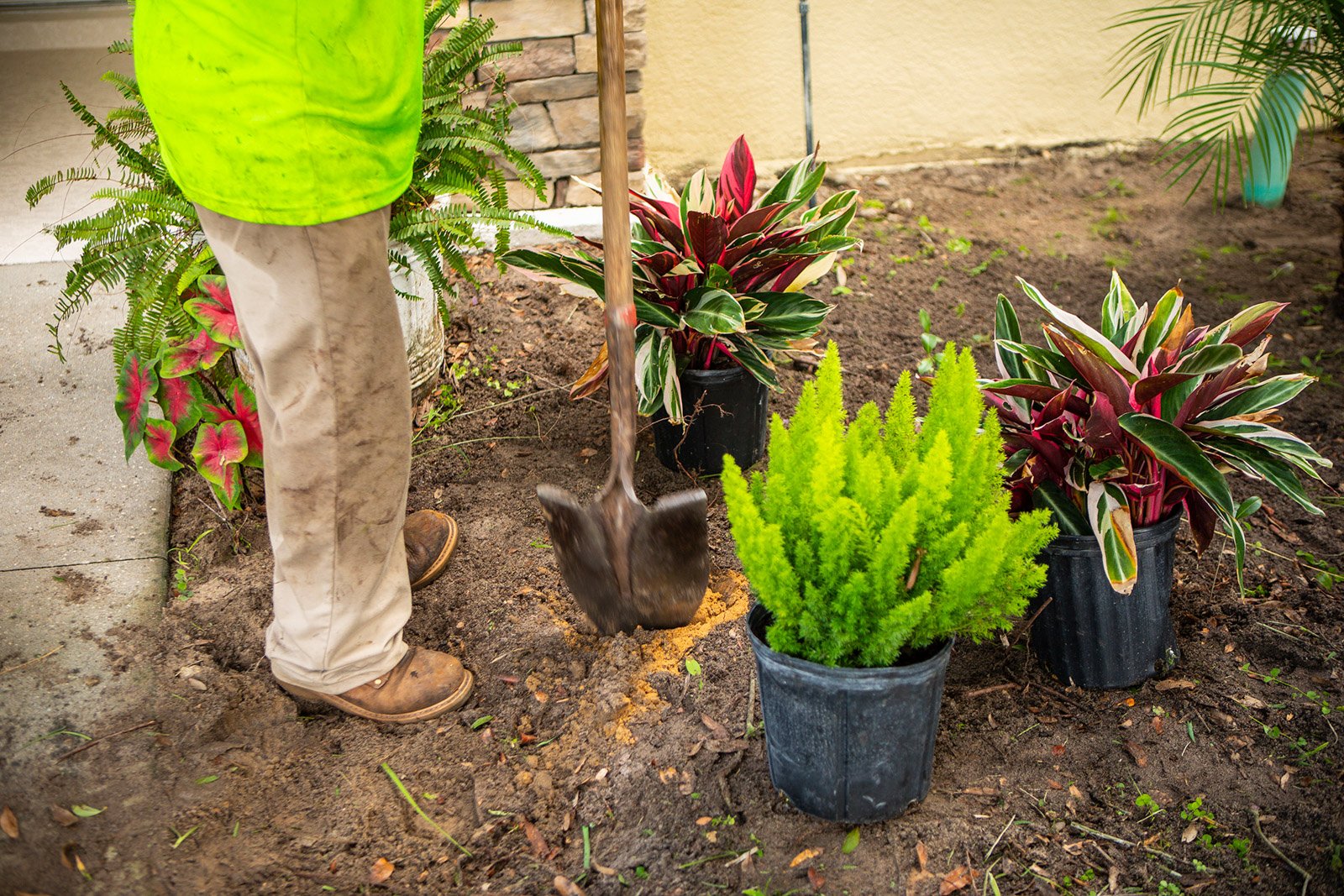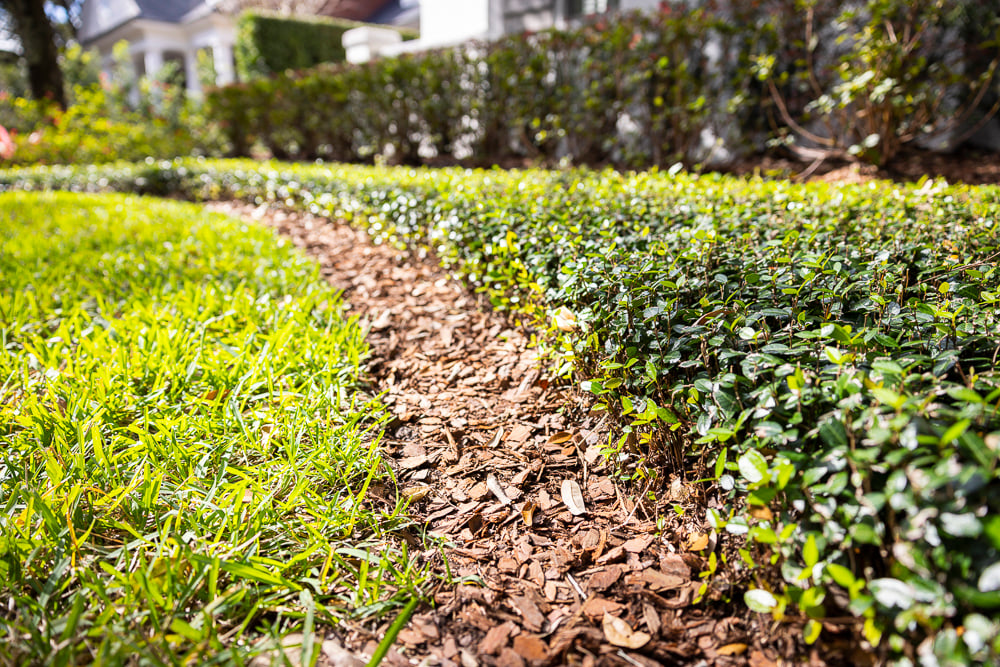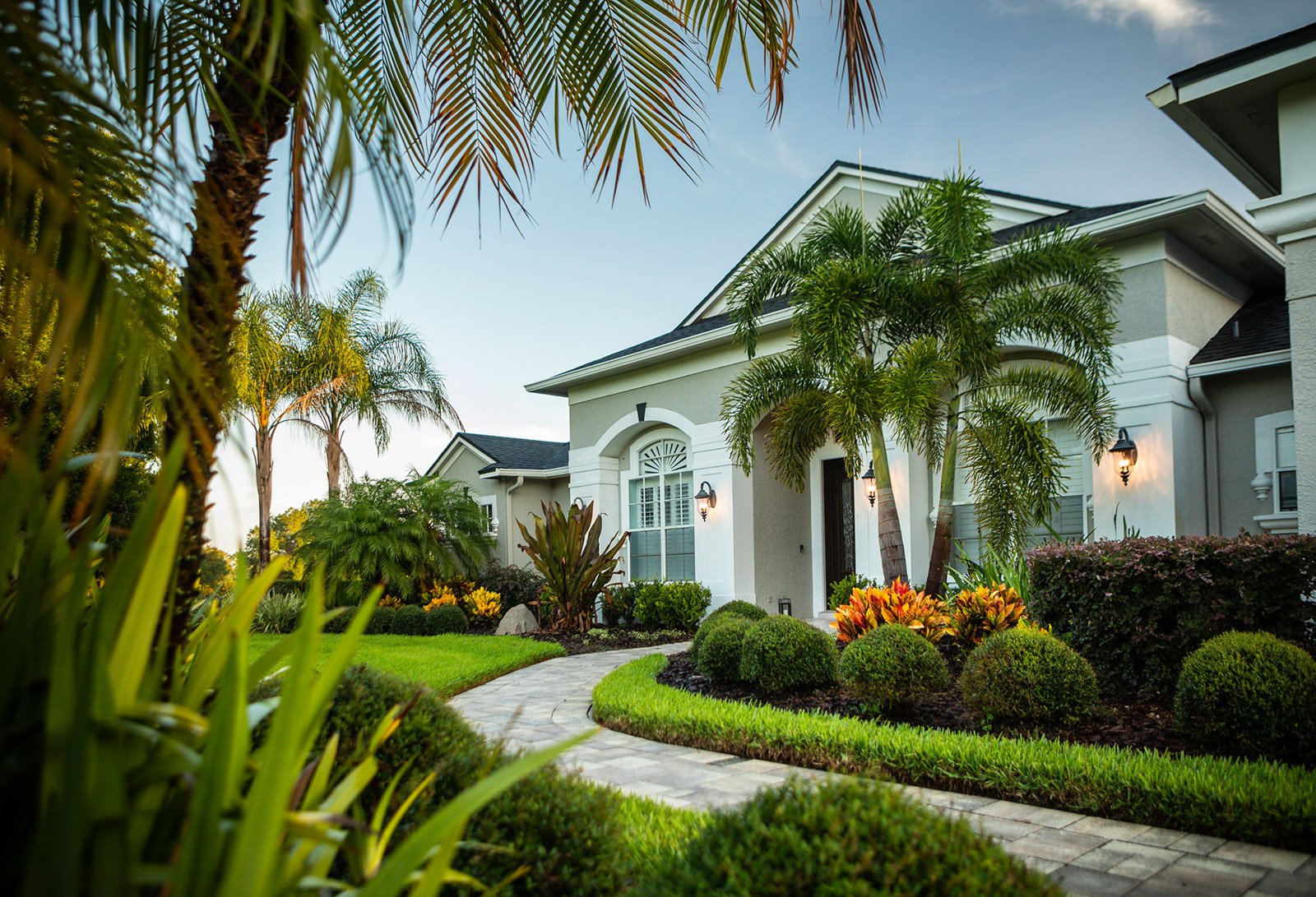A great tree next to your house is a landscaping no-brainer.
A palm tree offers a tropical welcome with a vacation vibe. A great flowering tree can make people gasp when they drive by.
The wrong tree will create roots that can grow right into your foundation, which also can cause gasps, but not in a good way.
Let’s learn more about trees that won’t damage foundations, including:
- Tree Roots and Foundations: Why They Don’t Mix
- Trees That Won’t Damage Foundations: Pick a Palm
- Foundation-Safe Trees in Central Florida: Ornamental Options
- Which Trees Should Not Be Planted Close to a House?
- Play It Safe with Shrubs and Grasses
What trees can be planted right next to a house? Well, no trees should be planted right next to a house. (More on this in a minute.) But many palms are great for foundation plantings. Other good options include smaller crape myrtles and ‘Little Gem’ magnolia.
Eric Frisch, Ground Source landscape designer, shares a few thoughts on the best foundation-safe trees for Central Florida.
Tree Roots and Foundations: Why They Don’t Mix
Foundation landscape designs almost always include trees.
Trees boost the visual appeal of your home by framing it with greenery, adding height and texture.
But not every tree is a good bet for close to your house. Wide-spreading tree roots and foundations don’t mix.

As tree roots grow, they branch out into the soil looking for moisture. If planted too close to your house they can hit your foundation, and they’re powerful enough to damage it.
So you want foundation-safe trees that don’t have extensive, far-reaching roots.
Even trees with smaller root systems should still be planted at least five feet away from your house to avoid tree root foundation damage.
Florida poses its own problems when it comes to planting trees near foundations, Frisch says, with hurricane-force winds and sandy soil that causes unstable root systems.
He says landscape designers are taught to use taller plants near the corners of homes to anchor the design and “frame” the house.
“But sometimes design needs to take a back seat to function and safety,” he says.
What trees are safe for foundations? Do palm trees have invasive root systems?
Trees That Won’t Damage Foundations: Pick a Palm
Good news: many of your Florida-favorite palm trees are a great choice for foundation-safe trees in Central Florida.
”Palms are the best option because of the larger size and smaller root balls,” Frisch says. “With smaller, more compact roots, they’re very strong, but don't need to have the spread and width of root systems you see on canopy or understory deciduous and evergreen trees.”
/raised%20patio%20with%20hardscape%20pavers%20and%20palm%20trees%20%20outdoor%20furniture%202.jpg?width=1600&height=1067&name=raised%20patio%20with%20hardscape%20pavers%20and%20palm%20trees%20%20outdoor%20furniture%202.jpg)
The Roebelenii Date Palm is a dwarf version usually planted in groups for a multi-trunk effect.
Feeling fancy? The Sylvester Date Palm has a distinctive diamond-cut trunk that makes a real luxury statement.
The Foxtail Palm is a palm tree standout, with its big fluffy fronds that look like the bushy tail of a fox. Bonus: it’s slightly cold-sensitive, if you live in Northern Orlando.
Need a native? Some HOAs require it. Check out the Sabal Palm, Florida's state tree.
But not every palm is a foundation-safe tree. The Canary Island Date Palm is a stunner, with a big trunk and long fronds. But this beauty needs a big, open area to fit properly in the landscape.
Foundation-Safe Trees for Central Florida: Ornamental Options
“Even smaller ornamental trees can have spreading roots,” Frisch says, “but working with smaller varieties that don't get as big will also mean the smaller roots touching the house foundation won’t affect the building itself.
“Just give them room to spread the canopy so it can grow over the roof a little at maturity.”

A couple good choices, with no worries about tree root foundation damage:
‘Little Gem’ Magnolia
This pretty flowering tree features dark, glossy leaves that contrast nicely with its big white blooms.
It’s named “Little” for a reason — it’s smaller than its full-size counterpart, making it great for planting near your house.
Crape Myrtle
Dwarf varieties are best, as larger crape myrtle varieties can develop extensive root systems that can cause tree root foundation damage.
“Smaller cultivars of crape myrtles can also be used as large bushes,” Frisch says, “because they tend to be multi-trunk from the start when they’re grown in the nursery.”
Which Trees Should Not Be Planted Close to a House?
“I try to avoid anything that’s a major canopy tree,” Frisch says.
Sorry, shade lovers.
“As much as we would love to have some shade to keep our cooling bills a little lower, they can have very expansive root systems and provide a risk of damaging a house during a storm from limb breakage,” he says.
That means no elms.
“Elms tend to tip over quite often, so having something pulling up on the roots whenever they begin to lean could damage the foundation if it’s large enough,” Frisch says.
Everybody loves magnolias, but they’re risky, too, Frisch says. Their dense canopies can catch a lot of wind, making them at high risk for tipping, and they have big root systems, too. Stick with the ‘Little Gem’ variety he suggested earlier.
Some trees can be tricky. You’d think they’d be foundation-safe trees, just by looking at them. Italian cypress, for example. It’s tall and skinny. Great for right next to your house, right?
Not so fast, Frisch says.
“Yeah, they’re tall and skinny, but they shouldn't be used near the foundation because their roots spread very far and are shallow,” he says. “They can easily tip over in storms because of those shallow roots, so they’re not ideal in Florida.”
Here’s a great place to point out the value of working with a skilled landscape designer like Frisch who knows Florida’s quirks and can keep you from making costly mistakes. He knows stuff.
Play It Safe with Shrubs and Grasses
Is all this talk of tree root foundation damage making you nervous? We’ve got you.
Other options exist to create stunning focal points for your foundation landscaping without using palms or ornamental trees.

Some shrubs can act as “mini trees” in your foundation, Frisch says.
He shares a few favorites:
Gardenias are famous for their beautiful, fragrant blooms, and their lush green foliage adds texture and interest to a foundation planting design.
Jatropha is a flowering, tropical evergreen plant with multiple trunks and slender stems.
Varieties of privet, jasmine and hibiscus are also good choices, Frisch says.
Ornamental Grasses
Not everybody loves ornamental grasses, but give them a chance, Frisch says.
“They aren't showy,” he says, “but it’s about a change of texture from the normal hedges or ground covers you see so much of.”
And no worries about tree root foundation damage.
A few Frisch favorites include muhly grass, sand cordgrass and Florida-native Fakahatchee grass.
Need Central Florida Trees Safe for Foundations? Trust Ground Source
Foundation trees are a great place to start when planning your Central Florida landscaping.
But they’re just one element of a great landscaping plan. An expert, thoughtful design can seamlessly integrate palms and ornamental trees, along with other Central Florida landscape design favorites.
What trees are safe for foundations? Let us help you figure it out.
We’re landscape experts, and our teams will help you plan your perfect outdoor space.
Sod, irrigation, landscape design: Let us transform your yard to create an escape you’ll love.
Are you ready to enjoy the vibrant, impressive yard you've always wanted? Request a quote today! We’ll help you review your options and then transform your property.







